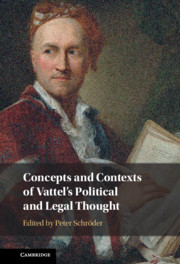Book contents
- Concepts and Contexts of Vattel’s Political and Legal Thought
- Concepts and Contexts of Vattel’s Political and Legal Thought
- Copyright page
- Contents
- Contributors
- Acknowledgements
- Concepts and Contexts of Vattel’s Political and Legal Thought
- Part I Historical and Intellectual Contexts
- 1 In Search of a Nation
- 2 Sovereignty Contested
- 3 The Development of the Law of Nations
- 4 Vattel and the Abbé de Choisy
- 5 Vattel and the Seven Years’ War
- Part II Concepts
- Part III Receptions
- Index
- References
3 - The Development of the Law of Nations
Wolff and Vattel
from Part I - Historical and Intellectual Contexts
Published online by Cambridge University Press: 11 June 2021
- Concepts and Contexts of Vattel’s Political and Legal Thought
- Concepts and Contexts of Vattel’s Political and Legal Thought
- Copyright page
- Contents
- Contributors
- Acknowledgements
- Concepts and Contexts of Vattel’s Political and Legal Thought
- Part I Historical and Intellectual Contexts
- 1 In Search of a Nation
- 2 Sovereignty Contested
- 3 The Development of the Law of Nations
- 4 Vattel and the Abbé de Choisy
- 5 Vattel and the Seven Years’ War
- Part II Concepts
- Part III Receptions
- Index
- References
Summary
The debate over Emer de Vattel’s originality as a thinker has a long history. He himself gave impetus to the question in the preface of his main work, the Law of Nations,1 by emphasising that the book owed a serious debt to Christian Wolff (1679–1754). Wolff was the leading German philosopher of the generation, preceding Immanuel Kant. He was the main advocate of Prussian school philosophy, also known as Wolffianism or alternatively as Leibnizian–Wolffian philosophy. The irony is that when one then picks up almost any standard account on Wolff, one soon learns that scholars have spent decades debating Wolff’s originality. Until relatively recently, Wolff was considered a mere follower and populariser of Gottfried Wilhelm Leibniz’s (1646–1716) philosophy.2 Simultaneously, adding a touch of further irony, Wolff, ‘Leibniz’s popularizer’, has been accused of being pedantic and boring. During the past three decades, Wolff has been increasingly recognised as an independent thinker with considerable originality, especially in the field of political thought, including his work on the law of nations.3 The aim of this chapter is to revisit Vattel’s relationship to Wolff in a balanced manner, with attention given to the similarities and differences between these two major advocates of natural law and the law of nations in the eighteenth century.
- Type
- Chapter
- Information
- Publisher: Cambridge University PressPrint publication year: 2021



